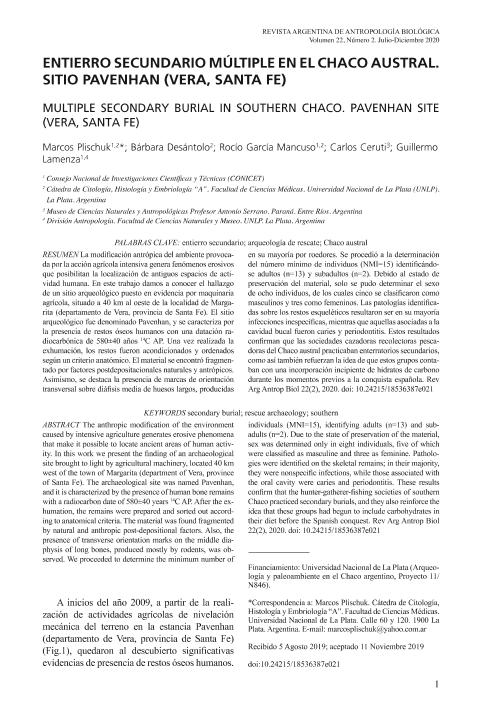Mostrar el registro sencillo del ítem
dc.contributor.author
Plischuk, Marcos

dc.contributor.author
Desántolo, Bárbara

dc.contributor.author
Garcia Mancuso, Rocio

dc.contributor.author
Ceruti, Carlos Natalio

dc.contributor.author
Lamenza, Guillermo Nicolás

dc.date.available
2021-03-10T03:19:37Z
dc.date.issued
2020-07
dc.identifier.citation
Plischuk, Marcos; Desántolo, Bárbara; Garcia Mancuso, Rocio; Ceruti, Carlos Natalio; Lamenza, Guillermo Nicolás; Entierro secundario múltiple en el chaco Austral. Sitio pavenhan (Vera, Santa Fe); Asociación de Antropología Biológica Argentina; Revista Argentina de Antropología Biológica; 22; 2; 7-2020; 1-15
dc.identifier.issn
1853-6387
dc.identifier.uri
http://hdl.handle.net/11336/127885
dc.description.abstract
The anthropic modification of the environment caused by intensive agriculture generates erosive phenomena that make it possible to locate ancient areas of human activity. In this work we present the finding of an archaeological site brought to light by agricultural machinery, located 40 km west of the town of Margarita (department of Vera, province of Santa Fe). The archaeological site was named Pavenhan, and it is characterized by the presence of human bone remains with a radiocarbon date of 580±40 years 14C AP. After the exhumation, the remains were prepared and sorted out according to anatomical criteria. The material was found fragmented by natural and anthropic post-depositional factors. Also, the presence of transverse orientation marks on the middle diaphysis of long bones, produced mostly by rodents, was observed. We proceeded to determine the minimum number of individuals (MNI=15), identifying adults (n=13) and sub-adults (n=2). Due to the state of preservation of the material, sex was determined only in eight individuals, five of which were classified as masculine and three as feminine. Pathologies were identified on the skeletal remains; in their majority, they were nonspecific infections, while those associated with the oral cavity were caries and periodontitis. These results confirm that the hunter-gatherer-fishing societies of southern Chaco practiced secondary burials, and they also reinforce the idea that these groups had begun to include carbohydrates in their diet before the Spanish conquest.
dc.description.abstract
The anthropic modification of the environment caused by intensive agriculture generates erosive phenomena that make it possible to locate ancient areas of human activity. In this work we present the finding of an archaeological site brought to light by agricultural machinery, located 40 km west of the town of Margarita (department of Vera, province of Santa Fe). The archaeological site was named Pavenhan, and it is characterized by the presence of human bone remains with a radiocarbon date of 580±40 years 14C AP. After the exhumation, the remains were prepared and sorted out according to anatomical criteria. The material was found fragmented by natural and anthropic post-depositional factors. Also, the presence of transverse orientation marks on the middle diaphysis of long bones, produced mostly by rodents, was observed. We proceeded to determine the minimum number of individuals (MNI=15), identifying adults (n=13) and subadults (n=2). Due to the state of preservation of the material, sex was determined only in eight individuals, five of which were classified as masculine and three as feminine. Pathologies were identified on the skeletal remains; in their majority, they were nonspecific infections, while those associated with the oral cavity were caries and periodontitis. These results confirm that the hunter-gatherer-fishing societies of southern Chaco practiced secondary burials, and they also reinforce the idea that these groups had begun to include carbohydrates in their diet before the Spanish conquest.
dc.format
application/pdf
dc.language.iso
spa
dc.publisher
Asociación de Antropología Biológica Argentina
dc.rights
info:eu-repo/semantics/openAccess
dc.rights.uri
https://creativecommons.org/licenses/by-nc-sa/2.5/ar/
dc.subject
RESCUE ARCHAEOLOGY
dc.subject
SECONDARY BURIAL
dc.subject
SOUTHERN
dc.subject.classification
Arqueología

dc.subject.classification
Historia y Arqueología

dc.subject.classification
HUMANIDADES

dc.title
Entierro secundario múltiple en el chaco Austral. Sitio pavenhan (Vera, Santa Fe)
dc.title
Multiple secondary burial in Southern Chaco. Pavenhan site (Vera, Santa Fe)
dc.type
info:eu-repo/semantics/article
dc.type
info:ar-repo/semantics/artículo
dc.type
info:eu-repo/semantics/publishedVersion
dc.date.updated
2021-03-05T18:58:32Z
dc.identifier.eissn
1514-7991
dc.journal.volume
22
dc.journal.number
2
dc.journal.pagination
1-15
dc.journal.pais
Argentina

dc.journal.ciudad
La Plata
dc.description.fil
Fil: Plischuk, Marcos. Universidad de Buenos Aires. Facultad de Medicina. Departamento de Biologia Celular E Histologia. Cat.de Histologia,citologia y Embriologia I; Argentina. Consejo Nacional de Investigaciones Científicas y Técnicas; Argentina
dc.description.fil
Fil: Desántolo, Bárbara. Universidad Nacional de La Plata. Facultad de Ciencias Médicas. Departamento de Ciencias Morfológicas. Cátedra de Citología y Embriología A; Argentina
dc.description.fil
Fil: Garcia Mancuso, Rocio. Universidad Nacional de La Plata. Facultad de Ciencias Médicas. Departamento de Ciencias Morfológicas. Cátedra de Citología y Embriología A; Argentina. Consejo Nacional de Investigaciones Científicas y Técnicas; Argentina
dc.description.fil
Fil: Ceruti, Carlos Natalio. Provincia de Entre Ríos. Dirección de Cultura. Museo de Ciencias Naturales y Antropología ; Argentina. Consejo Nacional de Investigaciones Científicas y Técnicas; Argentina
dc.description.fil
Fil: Lamenza, Guillermo Nicolás. Universidad Nacional de La Plata. Facultad de Ciencias Naturales y Museo. División Antropología; Argentina. Consejo Nacional de Investigaciones Científicas y Técnicas. Centro Científico Tecnológico Conicet - La Plata; Argentina
dc.journal.title
Revista Argentina de Antropología Biológica
dc.relation.alternativeid
info:eu-repo/semantics/altIdentifier/doi/http://dx.doi.org/10.24215/18536387e021
dc.relation.alternativeid
info:eu-repo/semantics/altIdentifier/url/https://revistas.unlp.edu.ar/raab/article/view/7425
Archivos asociados
